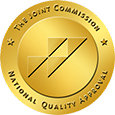An Integrated Approach to Healing OCD in Young Adults
To achieve long-term healing from OCD, young adults need treatment that provides relief from obsessions and compulsions, while addressing underlying causes and co-occurring mental health conditions. Without this full-spectrum care, young adults are vulnerable to relapse.
Newport Institute’s specialized OCD treatment incorporates Exposure and Response Prevention (ERP) therapy, considered the gold standard of care for OCD. In addition, clients’ treatment plans include psychiatric care, medication management, other evidence-based modalities (such as EMDR and Attachment-Based Family Therapy), experiential activities, and academics/life skills education.
OCD is classified as an anxiety disorder, because the symptoms of severe OCD can create extreme anxiety. However, OCD is also linked to other mental health issues. Therefore, Newport Institute provides tailored treatment plans for young adults with obsessive-compulsive disorder that also address common issues that occur alongside OCD, such as generalized anxiety disorder, agoraphobia, body dysmorphia, social anxiety, and panic disorders.
Symptoms and Causes of Young Adult OCD
How do I know whether I have OCD?
It’s not unusual to experience some degree of obsessive thinking, or a strong desire for things to be a certain way. In fact, people sometimes describe themselves as OCD when they really mean that they like to be neat and organized. But if you suffer from OCD, you know that this disorder is deeply painful and upsetting.
Young people with OCD are unable to turn off their obsessive and anxiety-producing thoughts. Therefore, the only way they can attempt to control these obsessions, as they are called, is by engaging in ritualistic behaviors known as compulsions. By repeating a behavior a certain number of times, ordering things in a very specific way, or otherwise obeying a set of rigid rules, they attempt to keep the anxiety of OCD at bay.
Questions?
All calls are always confidential.
Know the Facts
OCD in young adults not only compromises everyday functioning, it also increases the risk of suicide by as much as 10 times.
The Four Types of OCD Symptoms
Symptoms of OCD in young adults typically fall into one of four categories:
- Hoarding
- Checking
- Contamination
- Rumination
Consequently, some of the most common symptoms of severe OCD include:
- Fear of germs and getting sick
- Anxiety about your safety or the safety of a loved one
- Extreme concern about environmental contaminants or chemicals, such as asbestos or household cleaners
- Dread of blurting out insults or obscenities, or of hurting someone by accident
- Refusing to get rid of broken or worn-out things
- Obsessive thoughts about violence, sex, or hurting others or oneself
- Physical tics, including eye blinking, grimacing, shrugging, jerking one’s head, clearing one’s throat, grunting, etc.
- Repeatedly checking that light switches are off, doors are locked, oven is off, etc.
- Arranging objects in a very specific way
- Opening and closing doors or doing other tasks a prescribed number of times
- Constant washing of hands and other repetitive cleaning and checking of oneself or one’s things
- Compulsive counting, rereading, or rewriting.
What Causes OCD?
There are a variety of factors that increase the likelihood of OCD in young adults, including:
Underlying causes
Young adults who have experienced childhood trauma, such as physical abuse, sexual abuse, or the loss of a parent, have a higher risk of developing OCD.
Genetics
According to the National Institute of Mental Health, individuals whose parents or other family members suffer from OCD are more likely to develop the disorder.
Brain abnormalities
Research shows that OCD may be linked to abnormal structures or function in the frontal cortex and subcortical areas of the brain. A meta-analysis using data from 10 studies found that the brains of OCD patients respond to “error messages” in the neural network rather than heeding the brain’s signals to stop their behaviors.
Childhood PANDAS
Pediatric Autoimmune Neuropsychiatric Disorders Associated with Streptococcal Infections (PANDAS) refers to the development of OCD symptoms following a strep infection. Researchers believe that PANDAS is the result of an autoimmune response to the strep infection that affects brain cells, resulting in tics and other OCD-like behaviors.
Research suggests that OCD is more common in males during childhood, while OCD in young women is more prevalent during adolescence and young adulthood.
Diagnosis and Treatment of OCD in Young Adults
If you or a loved one have any of the OCD obsessions or compulsions listed above, a full assessment by a mental health professional is the first step to take. An assessment will likely include a physical exam to rule out physiological issues that might be causing OCD symptoms. An OCD screening will also include a psychological evaluation in which you will answer questions about your thoughts, feelings, and behaviors so the doctor can gauge the severity of your symptoms.
Moreover, your healthcare provider will ask questions to help determine whether you may be suffering from co-occurring disorders. Obsessive-compulsive disorder often goes hand in hand with other mental health issues, such as substance abuse disorder, eating disorders, trichotillomania (hair pulling), and excoriation (skin-picking disorder). In addition, OCD may be associated with neurological disorders like Tourette’s syndrome. Plus, people with OCD may suffer from depression or panic attacks.
Know the Facts
27% of people who seek treatment for OCD also meet the criteria for a substance use disorder.
What Is Treatment for OCD Like?
If you’re diagnosed with young adult OCD, the next step is to research treatment options. A healthcare provider can offer suggestions for researching therapy, outpatient care, or OCD residential treatment. Either outpatient OCD treatment centers or OCD residential treatment centers can provide comprehensive care for this disorder. However, longer-term care—three months or more—has been shown to be most effective in producing successful and sustainable outcomes.
Furthermore, OCD and anxiety treatment have a number of common elements. Most notably, some modalities are more effective than others in healing the root causes of anxiety and OCD, while also teaching young adults techniques for managing the symptoms of these disorders. Research shows that Cognitive Behavioral Therapy (CBT) is the most impactful treatment approach for OCD—specifically a form of CBT called Exposure and Response Prevention (ERP) therapy.
Know the Facts
Studies show that up to 70% of people with OCD experience significant improvement following treatment with Cognitive Behavioral Therapy.
Care at Newport Institute


Once you begin your healing journey at one of our OCD residential treatment programs, your Treatment Team will work with you, your family, and your referring professional to create a detailed Obsessive Compulsive Disorder treatment plan.
At Newport we combine together the experiential with the psychological. Our program is not rigid by design, it is constantly evolving based on the needs of each residence and also our experience of what works best. Our goal is to build a connection based on love and support instead of fear and rejection, reaching a state of transformation that will last
Dr. Michel Mennesson, MD
Psychiatrist
Young Adult OCD Treatment Plans at Newport Institute
Newport Institute’s OCD treatment is specialized for primary OCD, as well as other disorders on the OCD spectrum and severe anxiety disorders. These include trichotillomania (hair pulling), body dysmorphia, severe general anxiety and social anxiety, agoraphobia, and panic disorders.
Each young adult’s individualized OCD treatment plan includes a combination of the following modalities and approaches, as part of our integrated model of care:
Exposure and Response Prevention (ERP)
This form of CBT helps to reduce compulsive behaviors. In the last few decades, the development of ERP has shifted the success rates of OCD treatment from poor to very good. In ERP therapy, individuals gradually face their OCD obsessions without using compulsive behaviors to deal with their anxiety. Over time, they learn to trust that the anxiety will lessen without the compulsions. In addition, they learn skills for controlling the habitual compulsions.
Newport Institute’s young adult OCD programming incorporates 4.5 hours of ERP therapy each day, five days a week, delivered in both group and individual formats, as well as daily exposure homework.
Cognitive Behavioral Therapy (CBT)
CBT is proven to be helpful in addressing the underlying causes and the symptoms of young adult OCD. Clients learn to recognize the error messages their brain is sending, and develop new ways of responding to them. Furthermore, young adults learn to substitute irrational emotions with rational and more objective ways of thinking.
Psychiatric Care and Medication Management
Psychiatrists conduct comprehensive assessments at intake that inform medication recommendations, and closely monitor patient progress throughout their treatment stay, providing psychiatric evaluations each week, as well as medication management and education.
Acceptance and Commitment Therapy (ACT)
ACT addresses OCD by helping young adults learn to allow obsessions and anxiety to come and go, without letting them disrupt their lives. Hence, the symptoms are less distressing.
Experiential Therapies
Adventure Therapy, horticulture therapy, and creative arts therapies give young adults ways to process the anxiety associated with OCD and build skills for emotion regulation.
Attachment-Based Family Therapy (ABFT)
ABFT may be included in a Newport Institute treatment plan for young adult OCD because it helps to heal rifts in the family system. As a result, young people who are suffering from suicidal thoughts as a result of OCD are more likely to turn to their parents for help.
Our Medical and Clinical Team
At Newport Institute, obsessive-compulsive disorder treatment is delivered by a team of experts, including psychiatrists, family therapists, nurse practitioners, counselors, equine therapists, art therapists, music therapists, adventure therapists, registered dietitians, and more. Our philosophy of care is based in a foundation of compassion and unconditional love, and informed by research—including our own ongoing outcomes studies.
To find out more about our young adult OCD treatment, contact us today. We provide teen mental health assessments at no charge, either in person or virtually. Here’s where to get started on the healing journey.
Marks of Quality Care
Our innovative approach to mental healthcare earns accolades from press around the world, but it is our dedication to our client success that has helped us achieve accreditation from The Joint Commission, exceed licensing standards of care, and nurture affiliations with the following:





